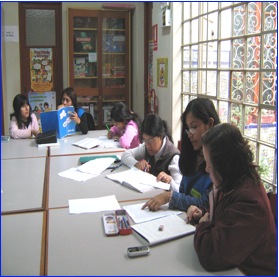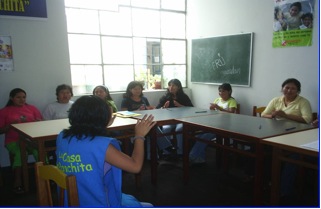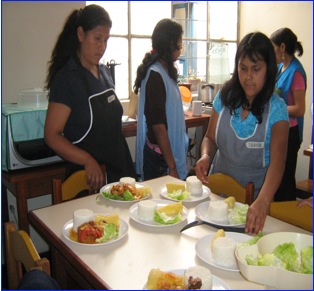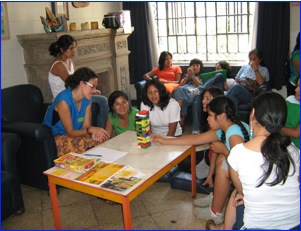
Chiara is an Italian friend living in Peru. She has written an indispensable article explaining all you have to do to employ domestic workers in Peru. Thanks Chiara!!!
Do you have any domestic worker helping you at home? This article serves your purpose.
Every year on March 30th Peru celebrates the Día de la Trabajadora del Hogar (Domestic Worker’s Day). On this day I got to the park close by in the heart of San Isidro, and despite it being a festival day and a Sunday to crown it all, domestic workers in white uniforms jarred against the greenness of the park, chasing after the toddlers they were looking after.
On the following day, the Peruvian government passed a law according to which domestic workers in Peru are no longer bound to wear a uniform in a club or in open air places. In other words, Lima’s well-known clubs will no longer require that nannies cross their threshold wearing a white uniform, unless they consent to.
A question occurs to me: will these nannies ever be allowed to touch, or skim the water of the swimming pools inside these clubs? Will they be allowed to use the affiliated restrooms? In the dressing rooms of the very same swimming pools, will we continue to see warning notices banning access to nannies, except if they have to change the children they have care of?
 Have you heard about the Día de la Empleada Audaz (Daring Domestic Worker Day) that caused a sensation in the press?
Have you heard about the Día de la Empleada Audaz (Daring Domestic Worker Day) that caused a sensation in the press?
In 2007 some human rights activists organised a demonstration: after disguising themselves as domestic workers, they invaded the beach in Asia, where shameful signs dominate the landscape restricting the use of the Pacific Ocean (!) to rich people.
La Casa de Panchita (https://www.gruporedes.org/) has just celebrated its 20th anniversary. It is an association devoted to the defense of the rights of domestic workers in Peru. It organises a set of training activities, ranging from courses to become a nanny or a maid (these courses cost 100 soles, or 50 soles if the learner brings along a friend to follow the training), IT courses (semi-free), as well as English language courses, marinera, craftwork, cookery workshops etc. It also offers free counselling with a psychologist and delivers training certificates approved by the Ministry of Labour.
The courses are delivered on Sundays, and the beautiful colonial mansion hosting the Casa de Panchita bursts with enthusiasm and optimism. The domestic workers who turn up at the Casa de Panchita do not always have a job, or if they do, their working conditions are not always decent. The house has turned into a job agency for potential employers. To be recruited, the applicant domestic worker must have attended a training course, or commit herself to follow one in the short run. The association also aims at breaking the vicious circle existing in families where one of the members is a domestic worker, so their children, especially young girls, are equally bound to become domestic workers from an early age. Awareness-raising and schooling initiatives are also organised in Lima’s most poverty-stricken areas.
In Peru, the law rules that children’s domestic work is only allowed from the age of 14, but it cannot exceed 4 hours per day, to ensure and encourage school attendance.
Domestic workers’ rights
Like many expats, when I arrived in Peru I was surprised to hear my domestic worker asking me to buy her a uniform and almost demanding to wear one. An unknown universe opened up to me: white uniforms are intended for nannies, blue or pink aprons should be used to do the chores, sneakers and caps should match in colour etc. But what really stunned me was that she refused my offer to regularise her position with a lawful contract for domestic work, implying above all the payment of social security benefits, which would have allowed her to take care of her health. Her reflection was that I did not need to pay her contributions as her husband had family access to social security, she suggested instead that I pay her the same amount in cash. My refusal was categorical: I knew that this money would not go for her periodic check-ups, and that she would have no money to afford a medical emergency.
Today she really appreciates that I compelled her to register for social security, she’s proud of her name sticking out among others at the local health center, and she feels more emancipated from her husband.
Unfortunately, only 8% of domestic workers enjoy social security benefits, this proportion rising to 11% among San Isidro domestic workers. In other words, 89% of domestic workers waiting on the richest families of the country have no social coverage. How can we expect a country to advance when its population cannot even look after its health?
Did you know that a law on domestic workers has existed since 2003? Do you know its content?
As we are likely to be employers, here is a little guide that will help you register your domestic worker. A written contract, as simple as it might be, will be much appreciated by your employee, who will be able to supply a written reference once you leave Peru. In addition to his/her wage (that is generally paid every fortnight), a domestic worker is entitled to a gratificación (a bonus equal to 50% of the monthly wage) at the end of July, and to another gratificación (again 50% of the monthly wage) for Christmas. Then comes the CTS (Compensación por Tiempo de Servicio, a kind of severance pay), that is due once a year, also 50% of the monthly wage. The CTS aims to make up for the absence of unemployment benefits. Last but not least, the worker is also entitled to 15 days leave per year.
The law rules that registration for social security must be completed not later than 30 days after the work contract’s effective date. If your domestic worker has been working for you for a long time without being declared, you can always suggest that she regularises her position by signing a work contract right away. It is also important to inform her that social coverage only starts after 3 months paying contributions.
To register, you need to have all the following documents:
– Passport or carnet de extranjería (original + copy)
– Electricity or phone bill proving your name and address
– Your domestic worker’s DNI (identity card, original + copy)
– Your domestic worker’s children and spouse’s DNI (original + copy), only if they still have no coverage by the Sunat
You then need to go to the nearest Sunat office.
Here’s a short list of the Sunat offices in some areas, as well as their opening hours:
-San Isidro
Jr. Juan de Arona N° 887
-Surco
Av. Paseo La Castellana 101,103-105 y 107 (Óvalo Higuereta)
There are no offices in Miraflores or La Molina, so you can just go to the San Isidro and Surco offices. Opening hours to the public are on Mondays to Fridays from 8.30 am to 5 pm, and on Saturdays from 9 am to 1pm. The procedures are incredibly quick and simple; you will immediately get a document assigning you a registration number in the Registro de Empleadores de Trabajadores del Hogar – TH.
Unless your lease is in your name, your spouse’s will appear on electricity and phone bills, so he/she will have to go to the Sunat office. My husband came home struck by the effective and quick procedure, it took him less than one hour on a Saturday morning. Do not forget to tell him to bring back a bunch of 1076 forms (Formulario 1076 – Trabajadores del Hogar), which will allow you to do the monthly payments in any bank.
Once you’re registered, you have to pay the EsSalud benefits (social security), which equal 9% of the monthly wage of your domestic worker. If she earns 800 soles, you should then pay 72 soles. You are also implicitly entitled to pay less, as law rules that the reference compulsory payment is 9% of minimum wage (550 soles), and not of the effective wage, so you can also pay just 50 soles. It is up to you to decide which way to go.
Turning to retirement benefits, you can choose between public and private schemes. The amount to pay is the same, and it applies both to the public scheme, called SNP (Sistema Nacional de Pensiones) and to the private scheme (better kwown as AFP). You will have to deduct 13% from the monthly wage of your domestic worker, and here again you will be entitled to deduct just 13% of the minimum wage (even though your employee earns more), in our example 72 soles.
How can one pay contributions? You can easily ask for the 1076 form at the Sunat offices or in any bank, where you can also make the payment. The form allows you to pay both EsSalud and SNP benefits. If your domestic worker chooses a private pension scheme, she needs to register. The most known AFPs are AFP Horizonte, Prima AFP and ProFuturo AFP. The website https://www.afpnet.com.pe will allow you to make online payments and contains all necessary information for registration.
If you cannot find a 1076 form (they are sometimes a rare commodity), you can also pay benefits at any Scotiabank branch (you don’t have to be a client of the bank) and report all the necessary information.
As we are reaching the end of this apparently intricate maze of red tape, I can reassure you that it is far less complex than it seems. This initiative will particularly enable you to fulfill two paramount goals: to ensure decent working and living conditions to a social class who is often discriminated against owing to its ethnic origins, and to enhance awareness that domestic workers in Peru have rights and that they must be respected.
For further information, here are a few official websites that will help you in your procedures:
Official website of Sunat, and section concerning domestic workers:
https://orientacion.sunat.gob.pe
Law on domestic workers in Peru (in Spanish)
Casa de Panchita:
https://www.gruporedes.org







